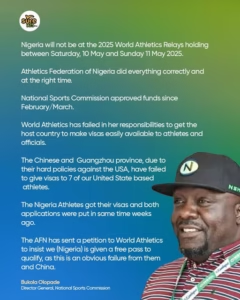The recent visa controversy that forced Nigeria’s withdrawal from the 2025 World Athletics Relays in Guangzhou, China, has again exposed the deep-rooted dysfunction within the Athletics Federation of Nigeria under Tonobok Okowa.
What began as an apparent diplomatic hurdle has since unraveled into a textbook case of poor planning, administrative negligence, and failed leadership.
In a bid to deflect criticism, Director General of the National Sports Commission, Bukola Olopade, initially blamed geopolitical tensions between China and the United States.
He claimed that China’s “hard policies against the USA” caused delays in visa approvals for seven U.S.-based Nigerian athletes. But that narrative quickly collapsed under scrutiny.

Team USA had already landed in China, putting a gaping hole in the claim that Chinese authorities were blocking U.S.-linked athletes.
If American athletes could secure visas, why not Nigerians, who have no dog in the trade war fight?
The excuse not only lacked credibility but seemed like a preemptive attempt to shape public opinion and shift blame from the real culprits: AFN’s leadership.
Olopade further asserted that visa applications for both Nigeria-based and foreign-based athletes were submitted at the same time.
Yet, only home-based athletes received visas promptly.
This contradiction intensified suspicions that something went wrong with the foreign-based applications — most likely late submissions or incomplete documentation.
The Chinese Embassy in Nigeria confirmed these fears.
In an interview with Premium Times, Cultural Counsellor Yang Jianxing stated that the Nigerian applications were received late and noted that the embassy, though working within a compressed timeline due to the May Day holidays, issued visas to seven athletes on May 8 — just hours before their scheduled flight.
“Next week, we plan to meet with the staff at the National Sports Commission to talk about this. We want to explain everything we did and make sure such an unfortunate result does not happen again.” Mr Yang said.
“We normally require a minimum of five working days to process and inspect visa applications,” he explained. “Unfortunately, due to the May Day holiday from 1-5 May, we lost valuable processing time.
“We released the visas at 5:10 p.m., and their flight was at around 9 p.m. I think, or earlier,” he said. “The time was extremely tight, but we did everything we could to fast-track the process.
“As a bureau, we need five days, but we shortened the inspection time to try our best to help. If the documents had arrived before the May Day holiday, the situation would have been different.”
So why did Nigeria pull out, even after visas were granted?
The question remains unanswered. But based on past patterns, many Nigerians are more inclined to believe the embassy’s account than that of the AFN. And rightly so.
Since Okowa emerged as AFN president in a controversial 2021 election, the federation has become synonymous with crises.
At the Tokyo Olympics weeks after his election, 10 Nigerian athletes were disqualified due to a failure to meet basic anti-doping testing requirements — the worst record of any nation at the Games.
In 2024, travel arrangements to the African Athletics Championships in Cameroon were so disorganised that athletes had to travel by road to Cotonou before flying, despite the risk such stress imposes on performance.
Then there’s Favour Ofili, a top sprinter who qualified for the Paris Olympics but was inexplicably dropped from the 100m lineup — without explanation.
Her exclusion not only diminished Nigeria’s medal hopes but exposed the opaque and arbitrary decision-making that now defines the AFN.
Okowa’s defenders often cite U.S. scholarships for Nigerian athletes as proof of success. But that’s a hollow argument.
Securing scholarships is largely driven by private coaches and families — not the federation.
The AFN’s job is to build a professional, supportive system at home that lets athletes thrive, regardless of where they train.
Instead, under Okowa, athletes are left to worry about travel chaos, disqualification risks, missing entries, and now, denied visas.
With AFN elections looming, stakeholders must take stock. The last four years have brought avoidable embarrassments, administrative incompetence, and broken trust.
The real cost of mismanagement isn’t abstract — it’s in the lost dreams of athletes who miss once-in-a-lifetime opportunities because their federation can’t get the basics right.
Nigeria deserves better. Our athletes do too.


